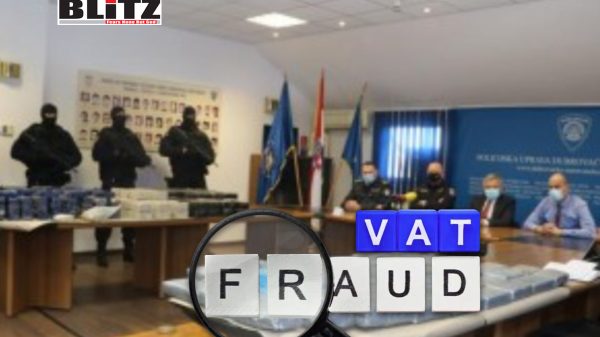EPPO uncovers massive €78 million VAT fraud in Croatia and Italy
- Update Time : Thursday, November 27, 2025

In a major development highlighting the European Union’s growing resolve against large-scale financial crime, the European Public Prosecutor’s Office (EPPO) announced on November 25 that it has uncovered the first multimillion-euro VAT fraud in Croatia. The sophisticated operation, involving 78 million euros (approximately $90.27 million) in unpaid tax, underscores the scale of cross-border tax evasion schemes within the EU and the importance of international coordination in combating them.
The investigation targeted a criminal network involved in trading electronics and hygiene products. The EPPO, in close cooperation with Croatian tax authorities, local police, and Italy’s Guardia di Finanza, executed a comprehensive operation resulting in multiple arrests and significant asset seizures in both Croatia and Italy. The case is considered a landmark for the EPPO, marking a decisive effort to disrupt highly organized tax fraud schemes that span multiple member states.
In Croatia, authorities arrested six suspects, five of whom face requests for pre-trial detention. The investigation revealed that the group had set up a complex web of conduit companies to execute fictitious intra-EU trades. These trades allowed the group to claim VAT exemptions illegally, effectively evading substantial amounts of tax. Croatian authorities froze two properties and eight vehicles belonging to the suspects, valued at approximately 650,000 euros ($752,240).
Investigators noted that the network was meticulously organized, with roles divided among members to manage logistics, administration, and accounting, ensuring the fraudulent activity remained concealed. EPPO prosecutors emphasized that such operations often involve multiple countries and require cross-border coordination to be effectively dismantled.
The investigation extended into Italy, where the Court of Naples froze 33 million euros ($38.19 million) in assets linked to seven alleged leaders of the criminal network, as well as 23 companies believed to be part of the scheme. In addition to these frozen assets, authorities have already seized over 1 million euros ($1.16 million) in real estate, luxury vehicles, jewellery, and cash. Several of the suspects involved are connected to a separate ongoing VAT carousel fraud trial in Italy, but the current investigation focuses on the primary network orchestrating these illicit activities.
Italian investigators reported that the network’s operations included providing warehousing, transport, and administrative services to facilitate the fraudulent trades. By coordinating logistics and document management, the group was able to conceal the origins and movement of goods, thereby obscuring the flow of VAT and minimizing the risk of detection.
The scheme uncovered by the EPPO falls under what is commonly known as a VAT carousel fraud. These types of frauds typically involve multiple companies across different EU member states, which exploit the value-added tax system to claim unjustified refunds or avoid paying VAT entirely. The mechanism often relies on “missing trader” companies, which collect VAT on sales but disappear without remitting it to the authorities. Conduit companies, like those identified in this investigation, are used to circulate goods and create the appearance of legitimate intra-EU trade.
According to EU officials, VAT carousel fraud represents one of the most lucrative forms of tax evasion in Europe, often involving hundreds of millions of euros and affecting multiple countries. Such schemes are notoriously difficult to detect because they involve complex chains of transactions, international trade, and layers of intermediaries designed to hide the perpetrators’ true identities.
The European Public Prosecutor’s Office, established in 2017, is mandated to investigate, prosecute, and bring to judgment crimes affecting the EU budget, including VAT fraud. This case in Croatia and Italy marks a significant success for the EPPO, demonstrating its capacity to coordinate cross-border investigations and tackle sophisticated financial crimes.
More than 110 officers participated in coordinated raids across 28 homes and business offices in both Croatia and Italy. The operation required meticulous planning and close cooperation between national authorities and EPPO investigators to ensure simultaneous actions, preventing suspects from destroying evidence or fleeing jurisdictions.
EPPO spokespersons noted that the operation sends a strong message to organized crime groups operating across the EU: that cross-border VAT fraud will not go undetected, and European institutions are increasingly capable of mounting large-scale investigations to protect public finances.
The financial impact of this fraud is substantial. Beyond the 78 million euros in unpaid VAT, the seizure of real estate, luxury goods, and corporate assets is expected to significantly disrupt the network’s operations. Analysts note that dismantling such networks has broader implications for the EU’s internal market, ensuring that fair competition is maintained and that legitimate businesses are not disadvantaged by criminal schemes.
Legally, the investigation may result in significant prison sentences for the suspects involved. European law provides for stringent penalties for VAT fraud, including custodial sentences, fines, and asset confiscation. By pursuing both individuals and corporate entities, authorities are aiming to address the full scope of criminal activity and prevent the reconstitution of similar networks.
VAT fraud investigations remain complex due to the sophisticated nature of criminal networks, the use of multiple jurisdictions, and the exploitation of loopholes in national and EU tax legislation. Investigators must navigate differing legal frameworks, language barriers, and the logistical challenge of simultaneous raids. The success of the Croatia-Italy operation demonstrates the effectiveness of well-coordinated cross-border enforcement, which EPPO officials hope will serve as a model for future actions.
Experts argue that continued vigilance and cooperation are critical. This includes enhancing real-time information sharing between tax authorities, strengthening auditing procedures, and improving digital tracking of intra-EU transactions. The European Commission has long emphasized the importance of robust anti-fraud mechanisms to protect the EU’s financial integrity, and the recent EPPO operation underscores the tangible results that such efforts can produce.
The discovery and disruption of this €78 million VAT fraud operation in Croatia and Italy represents a significant milestone for the European Public Prosecutor’s Office and European anti-fraud authorities. By targeting a sophisticated criminal network operating across borders, freezing assets, and arresting key suspects, the operation demonstrates the EU’s commitment to safeguarding its financial systems against organized crime.
As the investigation continues, authorities are expected to pursue further leads and potentially bring additional arrests. The case not only highlights the scale and complexity of modern VAT fraud but also reinforces the critical importance of cross-border cooperation in addressing crimes that threaten the integrity of the EU’s economic framework. For businesses and citizens alike, the message is clear: large-scale tax evasion is under heightened scrutiny, and Europe’s law enforcement apparatus is increasingly capable of dismantling sophisticated criminal networks.












